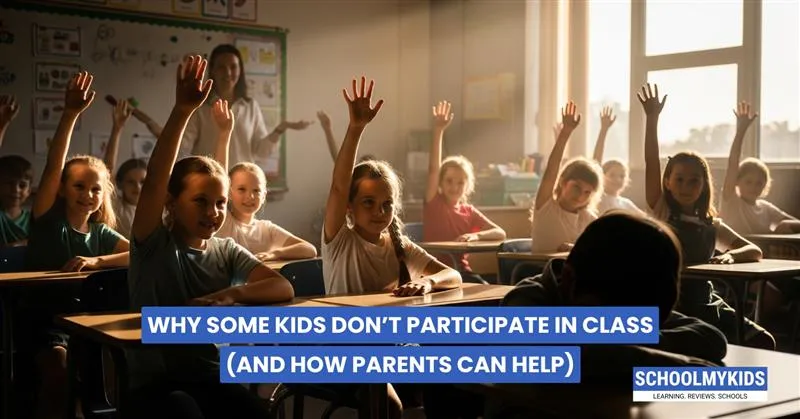You get the call from your child's teacher: "Your kid never speaks up in class." Your heart sinks. You know your child talks non-stop at home, so what's happening at school?
When kids go silent in class, there's always a reason. And it's rarely what we think it is.
Let’s break down the possible struggles kids face, and more importantly, how you as a parent can support them in a way that truly works.
The Shy Kid Reality Check
Let's start with the obvious one: shyness. But here's what most parents don't get: Shy kids aren't just "quiet." They're often drowning in overthinking.
Your shy child sits there rehearsing their answer in their head fifteen times, worried it sounds stupid. By the time they've decided it's "good enough," the teacher has moved on. They're not lazy or uninterested - they're paralyzed by perfectionism.
What you can actually do: Start practicing at home, but make it fun. During dinner, ask everyone to share one thing they learned that day. Keep it light. No corrections, no "that's not quite right." Just listen and respond with genuine interest. When your child gets comfortable sharing small things, they'll slowly build confidence for bigger moments.
The Fear of Looking Stupid
This one hits different. Some kids have been laughed at before, maybe for mispronouncing a word or giving a "wrong" answer. Now they're convinced everyone's waiting for them to mess up again.
Your child might have the right answer, but won't risk it because being wrong feels like social death. They'd rather stay silent than face that embarrassment again.
What you can actually do: Share your own "dumb" moments from when you were their age. Make it specific, "I once raised my hand to answer a math question and said 42 when the answer was 7. Everyone laughed, but you know what? The teacher thanked me for trying." Show them that everyone makes mistakes and survives them.
When Teachers Make It Worse
Sometimes the teacher is the problem, even unintentionally. Some teachers call on kids randomly, putting shy students on the spot. Others rush through lessons without giving kids processing time. Some accidentally favor certain students, making others feel invisible.
Your child might have a teacher who shuts down questions with "We don't have time for that" or makes kids feel stupid for not understanding immediately.
What you can actually do: Email the teacher, but don't attack. Try: "I've noticed my child seems hesitant to participate in class. They're very talkative at home, so I'm wondering if there's something specific that might help them feel more comfortable participating." Many teachers appreciate this heads-up and will work with you.
The Bullying Problem Nobody Talks About
Sometimes kids don't participate because they're being bullied, and it's not always obvious. It might not be physical. Maybe other kids roll their eyes when your child speaks. Maybe they get excluded from group work. Maybe someone makes fun of their ideas.
Your child learns that speaking up brings unwanted attention from bullies, so they go invisible instead.
What you can actually do: Don't ask "Are you being bullied?" Kids often don't recognize subtle bullying or are afraid to admit it. Instead, ask specific questions: "Who do you sit with at lunch?" "What happens when you answer questions in class?" "Tell me about the kids in your group projects." Listen for patterns of exclusion or mean behavior.
The Academic Struggle Cover-Up
Sometimes kids don't participate because they genuinely don't understand what's happening in class. They're lost, but they don't want anyone to know it. So they stay quiet and hope no one notices.
This is especially true for kids with undiagnosed learning differences. They might be working twice as hard as everyone else just to keep up, leaving no mental energy for class participation.
What you can actually do: Sit with your child while they do homework. Don't help immediately - just observe. Are they struggling with reading? Taking forever to process information? Getting frustrated with tasks that seem simple? If you notice patterns, talk to their teacher about getting an evaluation.
The Perfectionist Trap
Some kids set impossibly high standards for themselves. They won't participate unless they're 100% certain their answer is perfect and brilliant. Since that rarely happens, they stay silent.
These kids often do well on tests but never speak up in discussions because discussions feel risky and uncontrolled.
What you can actually do: Celebrate effort over perfection. When they tell you about their day, focus on the trying: "You asked a question in math today? That's awesome, questions help you learn." Stop praising only the A's and start praising the attempts.
Social Anxiety Goes Deeper Than Shyness
This isn't just being nervous. Social anxiety makes kids physically uncomfortable in social situations. Their hearts race, they sweat, they can't think clearly. Speaking in class feels like standing naked in front of everyone.
What you can actually do: Take this seriously. If your child shows physical symptoms (stomach aches before school, trouble sleeping, avoiding social situations completely), talk to your pediatrician. Sometimes kids need professional help to manage anxiety, and that's okay.
When They Just Don't Care (And Why That Happens)
Sometimes kids don't participate because they genuinely don't see the point. The material feels completely disconnected from their life. Why should they care about the Revolutionary War when they're worried about fitting in at lunch? Why discuss Shakespeare when they're passionate about video game design?
This isn't laziness, it's a disconnect between what school teaches and what feels relevant to them. When kids can't see how something connects to their world, their brain literally checks out.
What you can actually do: Start connecting school topics to their interests at home. If they love cooking and they're studying fractions, bake together and talk about measuring ingredients. If they're into sports and learning about physics, talk about the science behind their favorite athlete's moves. Show them that everything connects to something they care about.
The "Nobody Cares What I Think" Feeling
This one's heartbreaking but common. Some kids have learned that their opinions don't matter. Maybe they've been shut down at home when they try to share ideas. Maybe they've been told they're "too young to understand." Maybe their previous attempts to participate were ignored or dismissed.
These kids often have plenty to say, but they've learned that speaking up is pointless because adults don't really listen anyway.
What you can actually do: This starts at home. When your child shares an opinion - even one you disagree with - listen first. Ask follow-up questions: "That's interesting, why do you think that?" "Tell me more about that idea." Show them that their thoughts have value, even when they're still developing their reasoning skills.
Conclusion
The most important thing you can do is become their safe space to practice being heard. Create opportunities at home where their voice matters, like family meetings where everyone votes on weekend plans, letting them choose restaurants sometimes, and asking their opinion on family decisions.
Most importantly, when they do speak up at home, really listen. Put down your phone. Make eye contact. Show them that their thoughts and feelings matter to you.
Remember: every kid who stays silent in class has a voice dying to be heard. Your job isn't to fix them; it's to help them find their courage to use it.








Be the first one to comment on this story.